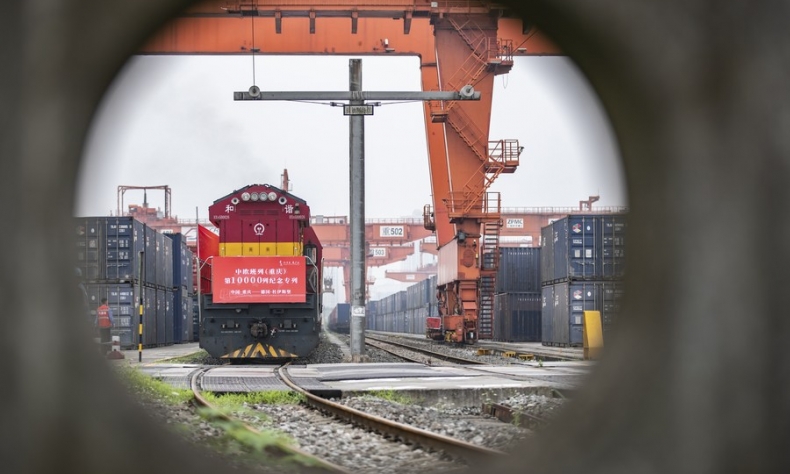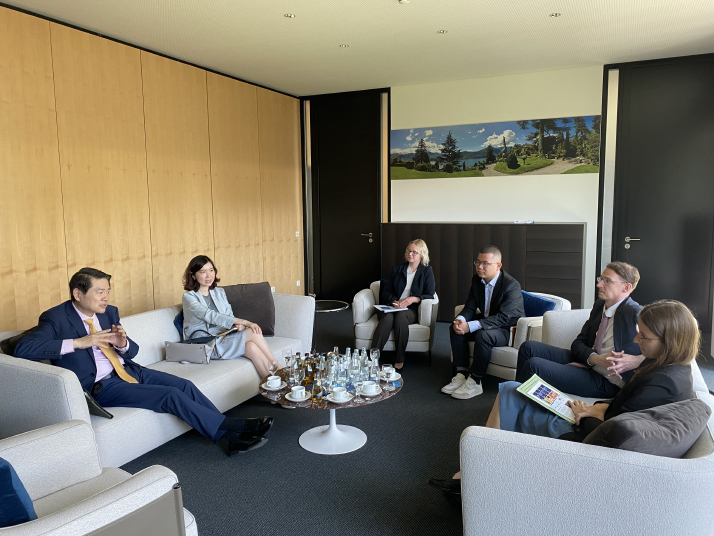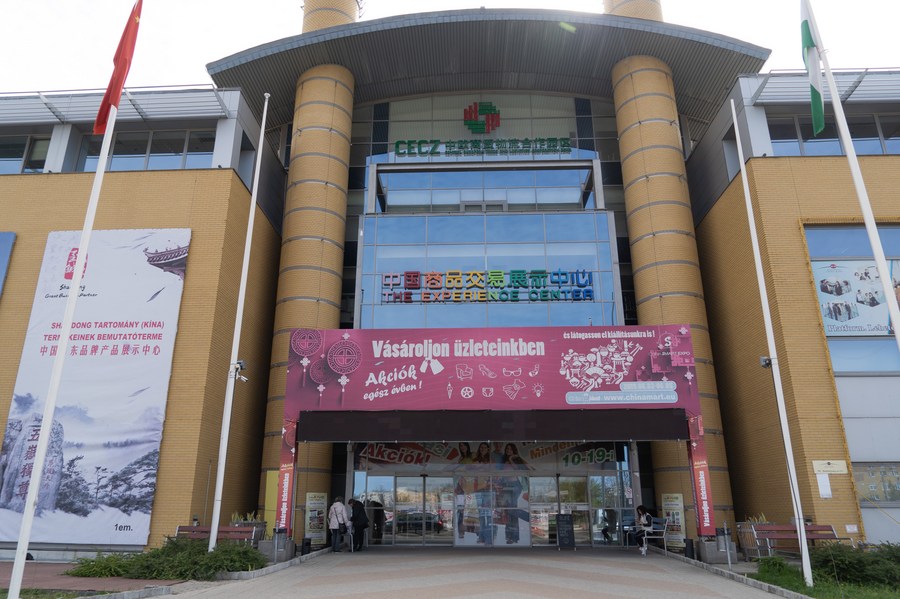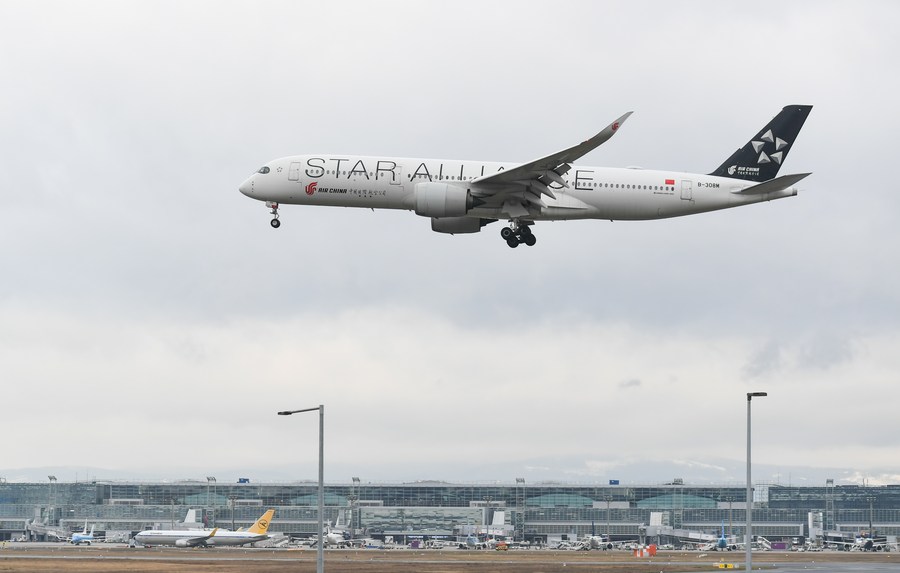CCG’s Europe Tour: A Close-up Look at New Trends in China-EU Relations

If a mechanism for high-level dialogue and coordination can be established, EU could act as a mediator between China and the U.S., rather than completely siding with the U.S., thus maintaining its relative independence.
Increasingly frequent high-level interactions between China and Europe over the past month have started to warm Sino-Europe relations, which had become cold given the currently tense geopolitical environment. Taking advantage of this momentum, the Center for China and Globalization (CCG), leveraging its advantages as one of China’s leading non-governmental think tanks, has recently embarked upon its own journey into “think tank diplomacy” and had extensive and in-depth cultural exchanges with counterparts in Europe and the United States.
From July 9 to 19, a delegation of CCG experts began a Europe Track II Diplomacy tour that took them to Paris, Berlin and Brussels where they interacted with hundreds of pundits in fields ranging from academia to policy-making, representing businesses as well as international organizations throughout Europe. This was the first Chinese think tank delegation to visit the continent since Covid-19 broke out, which is a positive signal that people-to-people exchanges are returning.
Well beyond our expectations
The enthusiasm, density, breadth and depth of our interactions with institutions in Europe that received us during the visit exceed our expectations. In the past three years, many of our contacts and organizations have changed, making it difficult to connect. When we visited Bruegel, a Brussels-based think tank, we found that its chairman had since moved to Berlin, but he entrusted our welcome reception to his very capable interim director and everyone’s enthusiasm was undiminished.
All the institutions we contacted were looking forward to and willing to come back to China. Experts from business circle, academia, and international organizations are looking forward to the shortening or elimination of quarantine requirements. They also welcomed experts, scholars and international students from China, and of course Chinese tourists in famous tourist destinations like Paris.

Three concerns from the European side
When talking with pundits from the World Bank, renowned economic think tanks like Bruegel, and some economic committees, we found that there was a lot of interest in whether China would be able to boost the world economy in the coming years.
China’s economy has become the engine, ballast and stabilizer of the world economy. During the pandemic last year, China set a new record in import and export trade volume with an increase of nearly 30 percent, and this momentum makes China a lynchpin of the global economy. Europe is currently experiencing an energy crisis due to the Russia-Ukraine conflict, and is about to go through a tough winter. If China fails to drive global economic growth, the energy crisis, compounded by inflation and food shortages, things will get even worse and the geopolitical situation will become increasingly unstable.
First, we had heated discussions on the state of the Chinese economy. The outside world knows that China’s real estate sector is going through a major period of adjustment, high-tech companies are not as robust as before, and multinational enterprises are also dialing down investment. However, at the same time, globalization experts generally recognize China’s rise to become the world’s second largest economy and its success in poverty alleviation. There is confidence that China’s economy will continue to drive steady global growth, but many are also concerned about the current slowdown in China’s economic growth.
Second, sanctions by both sides forced discussions on the Comprehensive Agreement on Investments (CAI) to be shelved. In November, three months from now, there will be discussions on whether to extend sanctions for a third year, giving us enough time to do more to lay a foundation that will incentivize both sides to lift sanctions.
Third, there was a lot of concern about the direction China will take in the midst of a constantly changing global environment. Biden’s approval rating continues to fall and has reached its lowest level since he took office. British Prime Minister Boris Johnson has resigned. French President Emmanuel Macron will face more resistance in the next five years. All of these imply intensifying social contradictions and rising social divisions, while the 20th CPC National Congress will show the world a stable, unified, and powerful CPC leadership, which makes Western countries question their own leadership.
Implications of CCG’s Europe tour
We have organized an intensive series of events that have served to restart and catalyze interaction between China and Europe. After our visit, many other colleagues in think tanks, academia and government institutions recognize CCG’s leadership in taking this step, making them wonder if they can take this step as well.
European chambers of commerce are also looking forward to visiting China and many business leaders emphasized that investing in China requires on-site visits, budgeting, strategic meetings and local team exchanges before they can make a final decision. However, the inability to be on-site for the past three years means that the original investment drive may wane or even disappear. European MNCs still want to invest despite an increasingly negative political environment and stricter controls placed on them as both the German and French governments will release strategic reports on China to assess the investment environment.

We also heard from Chinese enterprises that expos around Europe have returned, but there are no Chinese booths and they have been replaced by Vietnam, India and South Korea. Chinese enterprises used to be important participants in these expos, but now they are unable to attend. The number of exhibitors has plunged and there is no way to do business, expand investment and sell products. Many Chinese entrepreneurs feel their losing out when they see the momentum of other Asian companies and this makes them very anxious.
There is still a lot of misunderstanding about China and this visit attempted to clarify the issues and reiterate our position. China has done a lot in mediating the Russia-Ukraine conflict. We emphasize respect for sovereignty and territorial integrity. We have also offered Ukraine humanitarian assistance. President Xi Jinping has expressed his willingness on many occasions to promote peace talks through online meetings with heads of countries to resolve conflicts together. However, those we spoke with did not seem to know this and only knew of Sino-Russian cooperation, which is a result of information asymmetry. An important part of our visit this time was to increase trust and dispel doubts about China in Europe and to reiterate China’s stance and attitude.
Officials from Chinese embassies and senior diplomats have been proactively promoting exchange and embassy officials have said that as Europe’s economy and tourism industry recovers, the timing is right for China to restart people-to-people and cultural exchanges. They believe we made the right decision. Despite the risk and price, we truly believe this tour was worthwhile and very successful.
Five moves to improve Sino-European relations
Since the Russia-Ukraine conflict began, the European political community have felt that China is not on their side and have developed a negative view on China. One-sided reports in Western media have made many believe that China and Russia are allies and has prompted European countries to introduce some drastic policies, such as recent Strategic Concept for NATO exaggerating a “China threat”, which coneys a Cold War mentality. In view of these misunderstandings, we would like to put forward five moves that could set Sino-European relations on the right path.
First of all, China and the EU should resume CAI negotiations as soon as possible. In November, the EU will decide whether to extend sanctions for another year and we should encourage both sides to lift sanctions together by then. Once viewed as China’s second round of “reform and opening-up”, CAI is a more open and higher-level standard for European companies. China has also made a lot of efforts to launch the pact, including the passage and ratification of the International Labour Organization’s Forced Labor Convention (1930) by the National People’s Congress of China. Once CAI negotiations resume, bilateral investment between European and Chinese can be strengthened, which is something both sides are looking forward to.
Second, there is an urgent need to increase trust and dispel doubts. The German and French governments are now conducting strategic reports on Chinese government policies. We need to strengthen communication to reduce trust deficits and information asymmetry. If this is done, their reports would be more likely to reflect the real situation. European opinions on China’s business environment are also relatively negative, which is based mostly on reports released by the European Union Chamber of Commerce in China and opinions of EU companies in China. More efforts should be made in this regard.
Third, we should increase high-level dialogues as well as people-to-people and cultural exchanges. Exchanges between think tanks, scholars, experts, and international students should be restored, and tourism and sister-city exchanges should be resumed as soon as possible. Before the pandemic, 155 million Chinese people traveled abroad every year, which contributed greatly to China’s soft power. Chinese tourists used to be important consumers. We need to unleash this advantage.

Fourth, we need to further improve pandemic prevention measures to accelerate the easing of travel restrictions, reduce quarantine periods, and increase the number of flights. Policy instruments can be used to create more precise prevention and control systems to shorten the quarantine period for visitors. China is a beautiful place with clear waters and green mountains. We welcome European ambassadors to see the changes happening in Xinjiang and Hong Kong. Seeing is believing. It is the best explanation and the best diplomacy.
We need to do a better job of telling China’s story and make more friends in Europe. There is no fundamental geopolitical conflict between Europe and China. And economically, China and Europe are important partners. Both have long history, impressive cultures and ancient civilizations. To prevent political misjudgment and a decline in relations, we hope that we can find a balance and set China-EU relations on the right path.
The future of China-EU relations
China-EU relations have now entered a new stage of development. Since the Russia-Ukraine conflict, Europe and the U.S. have become even more closely linked in terms of ideology, values and security. The importance of geopolitics as a security factor has risen dramatically and Europe’s concerns about its own defense have surged. On the other hand, Europe and China have important economic ties as China is its largest trading partner. Europe stands at a crossroads, closer to the U.S. politically, but closer to China economically.
China and Europe share common views on many issues, such as climate change and digital economy. The EU is different from the U.S. in this regard. At the recent les Rencontres Économiques d’Aix-en-Provence, former French Prime Minister Jean-Pierre Raffarin noted that Europe should maintain its strategic independence. In our view, Europe was originally independent, now becomes reliant on the United States due to the war in Ukraine. Europe should be an independent party. It may lack military strength, but it has obvious advantages in terms of economy, soft power, and culture.
Premier Li Keqiang has been proactively engaging in discussions with European countries, including video meetings with President of the European Council Charles Michel and President of the European Commission Ursula von der Leyen, as well as a phone call with German Chancellor Olaf Scholz. As a signal of its dedication, four Chinese airlines recently announced that they would buy a total of 292 planes from Airbus worth $37 billion.
At several seminars held by European think tanks, we proposed the concept of “G3” – adding Europe to the “G2” format of China and the U.S. to form a “group of three (G3)”. In 2021, the total GDP of the U.S. exceeded $23 trillion, while the GDP of the EU was $17 trillion. If the UK and other European countries outside the EU are included, the GDP of Europe is over $20 trillion. China’s total GDP reached $17.7 trillion. Economically, China, the U.S. and EU are the three pillars that underpin the global economy.
These are also three regions of the world that have the greatest divisions. If a mechanism for high-level dialogue and coordination can be established, EU could act as a mediator between China and the U.S., rather than completely siding with the U.S., thus maintaining its relative independence. EU’s role as mediator can be developed slowly and the misunderstandings can be resolved through communication. The stability of these three major economy entities is the basis for world peace and development.
Wang Huiyao, President of the Center for China and Globalization (CCG)
Miao Lu, Secretary General of CCG
The article reflects the author’s opinions, and not necessarily the views of China Focus.
 Facebook
Facebook
 Twitter
Twitter
 Linkedin
Linkedin
 Google +
Google +










